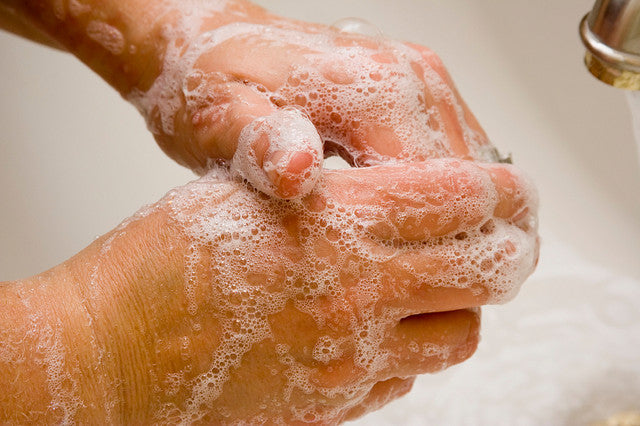
Are Antibacterial Soaps Doing More Harm Than Good?
By Dan DeBaunShare
Triclosan, an antimicrobial additive commonly used in toiletries (including hand soaps and some toothpastes), cleaning agents and other household products, is causing concern amongst some health officials. In Minnesota they have even taken the drastic step of banning this germ-killing agent from hand soaps that are produced for the consumer market effective 2017. An article titled 'Triclosan Under the Microscope', which was recently published in the American Chemical Society's weekly magazine, Chemical & Engineering News (C&EN), investigates whether these concerns are justified.
When triclosan was first introduced onto the market it was used exclusively in hospitals and other health care environments as an antimicrobial agent to kill germs and prevent the spread of disease. Triclosan is in fact a pesticide -- it kills tiny critters that could potentially make us ill. But it was considered a more harmless option for use as a surgical scrub compared to the biocides that were being used before it was available. However, once it became the standard antimicrobial agent in hospitals, it was marketed to consumers and soon become available to the masses. Today it is added to a wide range of toiletries, including toothpastes, deodorants, cosmetics, hand soaps and detergents, as well as general household products that we use on a daily basis, such as cutting boards, tooth brushes, toys and carpets, to name a few. In one study 75% of the studies participants had triclosan in their urine samples. So what?
According the EPA, triclosan is unlikely to pose a health threat to most people who come into contact with it. However, triclosan may accumulate in the system of certain individuals who are unable to metabolize the compound, who would then have higher levels of triclosan in their blood. Studies on animals have shown that triclosan can cause hormone disruptions and negatively affect the heart and muscles. The most vulnerable members of the population are breastfeeding babies and developing fetuses in the wombs of pregnant women with high exposure levels. Concerns of breast cancer have also been raised as a result of some lab tests.
Triclosan can also potentially lead to antibiotic resistance, which is another area of concern. The Food and Drug Administration (FDA) questions whether triclosan actually plays a significant- if any role in reducing infections, and has proposed stricter regulations that require manufacturers of antibacterial body wash and hand soap to prove that their products are more beneficial than ordinary soap and water in reducing the spread of infection and preventing illness.
“Antibacterial soaps and body washes are used widely and frequently by consumers in everyday home, work, school, and public settings, where the risk of infection is relatively low,” said Janet Woodcock, M.D., director of the FDA’s Center for Drug Evaluation and Research (CDER) in a statement. “Due to consumers’ extensive exposure to the ingredients in antibacterial soaps, we believe there should be a clearly demonstrated benefit from using antibacterial soap to balance any potential risk.”
Considering that after washing your hands with antibacterial soap or using an antimicrobial body wash in the shower, this soapy water -- now laced with the antibacterial agent (read pesticide) triclosan -- then flows down the plughole and enters the sewer, freshwater systems and/or soils, it also has environmental implications. Furthermore, as it may not break down readily in the environment, it is becoming increasingly likely that you may also be exposed this pesticide as a drinking water contaminant.
-
Regular price $234.00 USDRegular priceUnit price / per
-
Regular price $327.00 USDRegular priceUnit price / per
-
Regular price From $367.00 USDRegular priceUnit price / per
-
Regular price From $408.00 USDRegular priceUnit price / per
-
Regular price From $451.00 USDRegular priceUnit price / per
-
Regular price From $478.00 USDRegular priceUnit price / per
-
Regular price $332.50 USDRegular priceUnit price / per
$350.00 USDSale price $332.50 USDSale

Dan DeBaun is the owner and operator of Big Berkey Water Filters. Prior to Berkey, Dan was an asset manager for a major telecommunications company. He graduated from Rutgers with an undergraduate degree in industrial engineering, followed by an MBA in finance from Rutgers as well. Dan enjoys biohacking, exercising, meditation, beach life, and spending time with family and friends.
~ The Owner of Big Berkey Water Filters
















